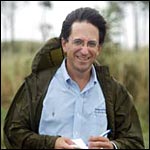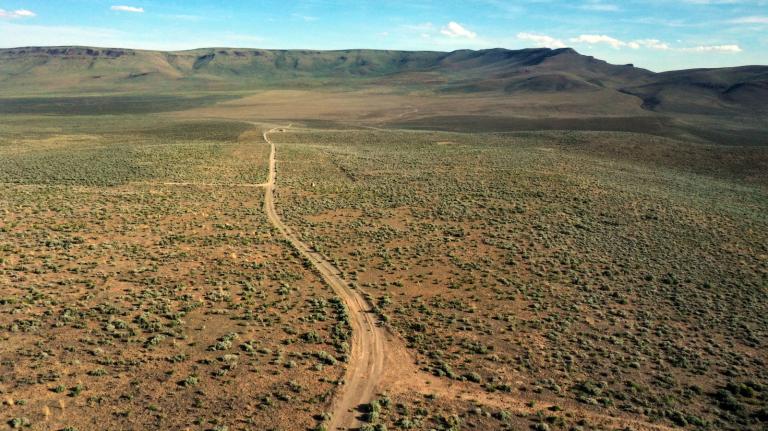Andy Revkin produced a truly bizarre piece over the weekend: "Middle Stance Emerging in Debate Over Climate." Frankly, I’m surprised it got past the NYT’s news editors.

It strikes me as a good illustration of the limits of traditional journalism, since what Revkin’s up to is not a description of a state of affairs — i.e., reporting news — but an attempt to frame a debate. Does that belong in the op-ed section? I’m not sure. It seems more like something that belongs on a blog. But it’s clearly not news, though I’m sure thousands of readers will take it that way. (Note the paucity of actual data points.)
Revkin clearly wants to be seen as a reasonable voice — not one of those kooky hippie extremists shunned by the Beltway Wise Folk. This has made him a rather gullible target for Roger Pielke Jr., for whom this "middle stance" has become a calling card and a ticket to media exposure. The entire piece reads like a Pielke press release — it’s a retread of his silly "nonskeptical heretics" shtick, about which I wrote here.
I find it wrong in every empirical detail and utterly wrong-headed in spirit.
Pielke wants us to believe three things:
- There is a "climate debate," dominated by extremists. On one side are those who say global warming isn’t happening, or isn’t a big deal. On the other side are those who say global warming will be a catastrophe and we should mobilize immediately to take action.
- Between these two extremes is a reasonable, balanced middle position, which is: We’re not certain exactly what the effects of climate change will be, but the potential risks are large, so it’s worth hedging our bets by acting to reduce emissions as an "insurance policy."
- The extremists on either side are invested in having a vicious two-sided fight and will thus try to exclude this reasonable middle stance.
This way of framing things has great appeal to those for whom being reasonable — or more properly, being seen as reasonable — is central to their self-image. The problem is, all those things are wrong.
On #1: There is no such two-sided debate. There is a group of people who spent a long time denying that climate change is happening. When that became untenable, they denied that warming is anthropogenic. That’s now becoming untenable, so they’re moving on to claiming warming will be mild, or we can’t do anything about it, or the best way to prepare is to avoid regulation.
These people are not involved in a "debate" by any normal understanding of that word. They are not advancing good-faith positions in an attempt to discover the truth. They are shills, advancing the interests of a set of industries and the politicians those industries fund. Their empirical arguments, to the extent they have any, have been utterly discredited. They are rarely taken seriously by anybody but right-wing bloggers and James Inhofe. Oh, and Pielke, who needs them to construct his centrist cosmology.
On the "other side" from the denialists is not the monolithic catastrophist camp of Pielke’s imagination, but a many-hued, multi-polar debate about how best to address climate change, how fast to act, how to communicate to the public about it, how much risk to tolerate, etc. Pielke sees himself as complicating and opening up the debate, but in fact he’s doing the opposite, reducing the varied questions and positions to a flat two-poles-and-a-middle dichotomy. Again, that may suit his purposes, but it’s not accurate.
On #2: what is the substantive difference between this position and the position global warming advocates have been advancing all along? Do these Wise Folk think global warming is not a big deal? No:
They agree that accumulating carbon dioxide and other heat-trapping smokestack and tailpipe gases probably pose a momentous environmental challenge …
Do they they think we shouldn’t be preparing? No:
Many in this camp seek a policy of reducing vulnerability to all climate extremes while building public support for a sustained shift to nonpolluting energy sources.
Sounds familiar. Perhaps the difference is that the Wise Folk think we should take small, incremental steps rather than making big policy changes? No:
Many in this group also see a need to portray clearly that the response would require far more than switching to fluorescent light bulbs and to hybrid cars.
One of the iconic Wise Folk, Mike Hulme of the Tyndall Center for Climate Change Research, is described thusly:
His goal, Dr. Hulme said, is to raise public appreciation of the unprecedented scale and nature of the challenge.
Gosh, that sounds familiar too.
So where’s the beef? What’s the difference?
Reading the story makes clear that the difference is one of tone and emphasis. This is about rhetorical style and temperament, not substance. The Wise Folk want to frame action as risk reduction and insurance policy rather than mobilization and crisis control. They want, in Revkin’s near-parodic words, "the public to engage now, but not to panic."
To summarize: Aside from the denialist cranks, everyone agrees that global warming is a looming problem of unprecedented scale that needs to be met with long-term, fundamental change. But the people in the "middle" are unique in that they don’t want the public to panic about it.
That’s fine with me — people can frame things however they want, however they think will be effective. But please spare us the canard that speaking in sweet dulcet tones that won’t alarm David Broder puts you in the middle of some two-poled debate. It just makes you more likely to get on Meet the Nation.
As for #3, this is where Pielke reveals more than he intends. Because the issues here are so obviously about rhetoric and not substance, he correctly senses that people who have been advocating around this issue for years are going to say, "hey, that middle way sounds a hell of a lot like what we’ve been saying all along." And that would deny Pielke his position as Official Spokesman for the Wise Folk. We can’t have that:
I fully expect that many of the usual suspects on the extremes of the debate (both sides) will respond to this story by saying that they’ve been in the middle all along. A two-sided debate rarely welcomes a third view, especially one that makes as much sense as that espoused in the NYT article.
Not to be all intemperate and extreme, but give me a %@#! break. Don’t worry, Roger, nobody’s going to try to take your ball. You make the mostest sense of anyone, ever. Happy?
Sigh. There’s tons more to say about all this, but this post has gotten way too long. More later.


